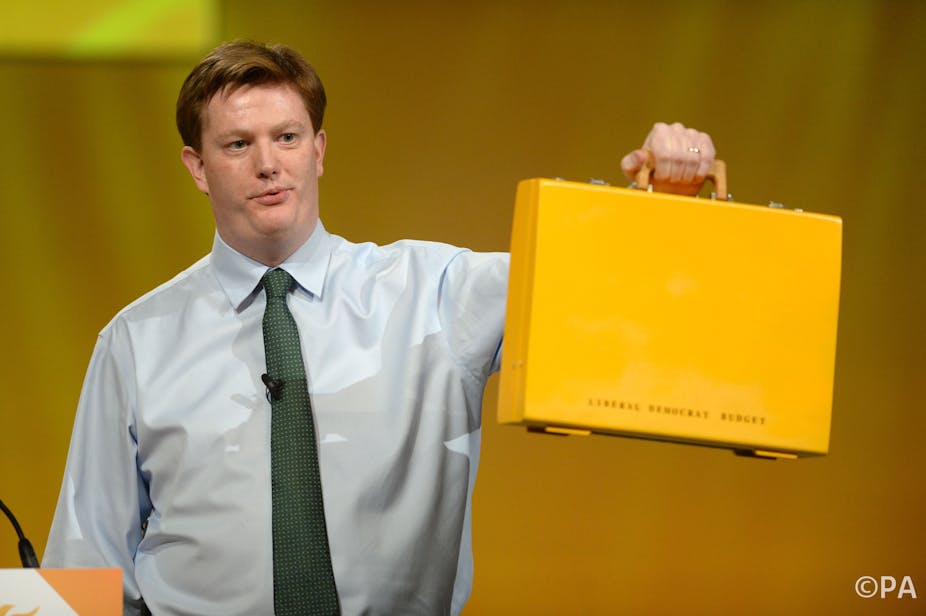Most of the commentary in the build up to the last Budget of this Parliament will, predictably, focus on the contents of George Osborne’s little red briefcase on March 18.
Few will focus on the logistics of what could happen after – the parliamentary procedure for implementing budgets. That’s because these are usually pretty uncontroversial. Budget announcements usually get rubber stamped through parliament with little fuss and bother.
But maybe not this time. With only 50 days between the Budget and the general election, we may well see some political posturing from not just the opposition, but the coalition’s junior partner that could challenge the budget’s passage through parliament.
Parliamentary procedure
The House of Commons Standing Order 48 effectively prevents – for spending – anyone putting forward public spending proposals other than “the Crown”. No, not the Queen – in this case it means the government (though it is officially Her Majesty’s Government in our system, remember).
This rule has been extended, in practice, to proposals for taxation – so only the Crown can propose to maintain, or raise, or introduce new taxes.
This somewhat bizarre provision means all MPs can do is either endorse the government’s proposed spending plans or and, although this happens very rarely, propose to reduce spending (or taxes) on something or other. They could also, in theory, reject all the spending (and tax) proposals – although to my knowledge that has never been tried in modern times.
Many believe that any rejection or reduction of a tax or spending proposal would be tantamount to a vote of “no confidence” in the government of the day – and therefore trigger its resignation and an election. This helps to explain why, in more than 100 years, there have been only about 20 successful attempts in the British parliament to amend the government’s tax-and-spend proposals. Interestingly, none of them was regarded as a confidence vote; no government fell and no elections were called as a result of these defeats.
The 20 or so times there have been revolts in parliament over specific tax or spending measures in the past century have nearly all been non-party affairs. The political parties – especially the main two – have not sought to discomfort the party in office when in opposition. The main reason for this, as with many other aspects of our quasi-monarchical state, is that they hope themselves one day to be in office and operate the Crown prerogative powers of the executive.

Possibility of budget disruption
Two factors since the last election could change this. The Fixed Term Parliaments Act of 2011 lays to rest, at least in law, the idea that any defeat on a finance or supply motion is automatically a vote of (no) confidence. The act spells out precisely what does constitute a vote of confidence.
The second development is the coalition government. In this new multi-party, coalitional world of Westminster who knows what will happen after March 18.
Will George Osborne include in his Budget any proposals that the Conservatives’ coalition partners, the Liberal Democrats, do not agree with? And if he does would they dare join forces with Labour and others to vote down spending or tax proposals they don’t like?
Could the Liberal Democrats take the initiative and, in a bid to differentiate themselves from the Conservatives, put forward some highly symbolic amendment of their own on tax or spending – for example rejecting some Tory tax cut aimed at boosting Conservative chances in the general election?
Could Labour do the same? Or the SNP put forward an amendment to cut defence spending on Trident (their symbolic differentiator from Labour)? Or the two UKIP MPs propose amendments to not pay our subs to Brussels?
There are all sorts of possibilities. But my guess at the moment is that Westminster traditions are still too strong. They are so entrenched that most MPs in the House of Commons won’t even realise they could make all sorts of mischief even within the arcane restraints of Standing Order 48 and parliamentary customs.
But I’d also guess these fetters on parliament will not long survive another coalition, or even more likely minority government, after May 2015. The chances that parliament will eventually get around to repealing Standing Order 48 and asserting real, as opposed to purely titular, parliamentary sovereignty over “getting and spending” is becoming ever more likely.

